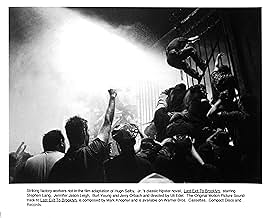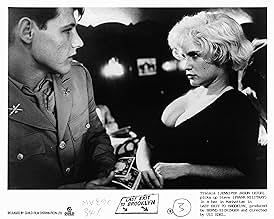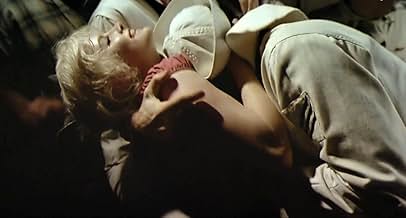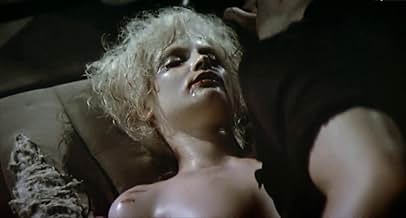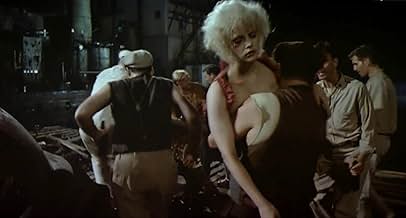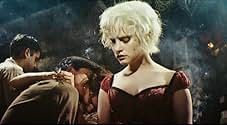IMDb RATING
6.8/10
7.4K
YOUR RATING
Set in Brooklyn during the 1950s against a backdrop of union corruption and violence. A prostitute falls in love with one of her customers. Also a disturbed man discovers that he is homosexu... Read allSet in Brooklyn during the 1950s against a backdrop of union corruption and violence. A prostitute falls in love with one of her customers. Also a disturbed man discovers that he is homosexual.Set in Brooklyn during the 1950s against a backdrop of union corruption and violence. A prostitute falls in love with one of her customers. Also a disturbed man discovers that he is homosexual.
- Director
- Writers
- Stars
- Awards
- 6 wins & 1 nomination total
Frank Acciarito
- Eddie
- (as Frank Acciarto)
- Director
- Writers
- All cast & crew
- Production, box office & more at IMDbPro
Featured reviews
Last Exit to Brooklyn is a great flick. It's brutal, dark, funny as heck at times, and in the end uplifting. Watching this movie it was hard to imagine this was based on a book from the 50's. A book which explores homosexuality, prostitution, sexual confusion would seem to be almost unheard of subjects in the uptight, Leave It To Beaver 1950's. People who put down this film don't know what they're talking about. The author of the book this movie was based on said himself he thought this was one great adaptation of his novel. And he was sure right. Folks who can handle the dark, brutal films of David Lynch, the Coen Brothers and Tarantino, Scorsese, Kubrick, Hartley and Fosse will dig this movie. But if "You've Got Mail" is your idea fo a great rental, you won't like it a bit. It's just as well, a lot of great, cool films aren't for everyone.
Did you ever notice that if you were to show a film to after dinner friends, all too often what you bring out is a work that might not make a list of your personal top ten favorite movies? This is one of those films. Very postwar early 50's, but a 1950's Donna Reed would have been lost in. It truly is the opposite of Pleasantville.
Hubert Selby's dark vision of the common man is woven around several characters in a Brooklyn neighborhood. A factory worker called Big Joe is played by Burt Young. Instinctively brutal yet pathetically naive, he wanders through his Brooklyn neighborhood functioning at the most elemental level reinforced only by an inherited value system to which he is single-mindedly loyal. Jennifer Jason Leigh plays a whore whose timeline for thoughts of her future stretches out only several hours. She gets by in life rolling drunks whose tolerance for liquor is less than hers, or giving sex to those who outlast her. A soldier soon to be shipped out takes her to Manhattan for his last few stateside days and falls in love with her. Tralala (Leigh's character) recognizes the attendant lust but has no clue about the implications of his love. As she sees him off, the Lieutenant hands her an envelope. Tra's face lights up as her vision of the order in life (she gives him sex, he has a good time, he gives her money) seems to have been reaffirmed. When the envelope turns out to contain a lengthy love letter she doesn't become angry or disappointed, just confused.
In addition to Leigh and Young, powerful performances are turned in by Jerry Orbach (the corrupt union boss), Stephen Lang (the closet homosexual strike-line foreman), Stephen Baldwin (a street punk), Ricki Lake (Big Joe's very pregnant daughter), and Alexis Arquette (the teen-age transvestite).
The soundtrack is excellent and unobtrusive and Uli Edel's direction insightful. You need a strong stomach to watch it and quite a bit of dedication to find it, but it's well worth the effort.
Hubert Selby's dark vision of the common man is woven around several characters in a Brooklyn neighborhood. A factory worker called Big Joe is played by Burt Young. Instinctively brutal yet pathetically naive, he wanders through his Brooklyn neighborhood functioning at the most elemental level reinforced only by an inherited value system to which he is single-mindedly loyal. Jennifer Jason Leigh plays a whore whose timeline for thoughts of her future stretches out only several hours. She gets by in life rolling drunks whose tolerance for liquor is less than hers, or giving sex to those who outlast her. A soldier soon to be shipped out takes her to Manhattan for his last few stateside days and falls in love with her. Tralala (Leigh's character) recognizes the attendant lust but has no clue about the implications of his love. As she sees him off, the Lieutenant hands her an envelope. Tra's face lights up as her vision of the order in life (she gives him sex, he has a good time, he gives her money) seems to have been reaffirmed. When the envelope turns out to contain a lengthy love letter she doesn't become angry or disappointed, just confused.
In addition to Leigh and Young, powerful performances are turned in by Jerry Orbach (the corrupt union boss), Stephen Lang (the closet homosexual strike-line foreman), Stephen Baldwin (a street punk), Ricki Lake (Big Joe's very pregnant daughter), and Alexis Arquette (the teen-age transvestite).
The soundtrack is excellent and unobtrusive and Uli Edel's direction insightful. You need a strong stomach to watch it and quite a bit of dedication to find it, but it's well worth the effort.
I remember my intense eagerness to see this film. I wasn't entirely sure why at the time but when I finally saw it in 1990 I was devastated and soon addicted to this sad tale of city life spiralling out of control. Its a film with an epic quality and a grand, sweeping style that turns the city scape into a character in itself. This was Uli Edel's (as he was then known) classic and it remains a remarkably strong film. Its not pretty and doesn't hold back in revealing the light and dark of its characters. Brutal it may be, but there is something vital and alive seething in this movie with anger and pain. Its source is Hubert Selby Jr's novel. I believe its a superior adaptation.
The film is based around a union strike which threatens to cripple the city of Brooklyn in the 1950s. The film focuses several characters; Harry, the troubled union leader struggling to come to terms with his desires for other men and his gender-bending lover against the anger, aggression and hypocrisy of the era; a woman, TraLaLa, who sells her body for money but finds herself committing the ultimate crime of her profession by falling for a client - an army man destined to hurt her; a family with a daughter pregnant out of wedlock; a gang of aimless young men hungry for trouble; and a young teen looking for love in TraLaLa.
Its a film full of fascinating performances which reinforce the greatness of this film. Jennifer Jason Leigh burst into the spotlight with her startling performance as TraLaLa. She embodies the role with unceasing honesty and vigour. It is her late scenes in the film which rip at the heart, especially when she finds compassion in an unlikely source at the worst of moments. Her portrayal doesn't seek sympathy - on the contrary Jennifer Jason Leigh gets deep inside the cruel and manipulative character to reveal the hope beneath without a false note. Peter Dobson, Stephen Baldwin are a brilliant combination as the thugs and Alexis Arquette is remarkable as their taunted worshipper, Georgette. Ricki Lake, Sam Rockwell and Stephen lang also excel in a great ensemble film.
I can still picture vividly the majesty and intensity of the strike riot and the water spraying at the wire fence as strikers confront the police.
There are many great scenes such as this which combined with striking performances and an unflinching script and score make Last Exit to Brooklyn a modern masterpiece. This is a highly underrated film, mainly because of the view that the subject matter is too seamy, grotesque and extreme. And there is no doubt this is a confronting, violent and provocative film experience. Unfortunately, because of this widely heralded view, many people are missing out on an unacknowledged classic. Don't miss out.
The film is based around a union strike which threatens to cripple the city of Brooklyn in the 1950s. The film focuses several characters; Harry, the troubled union leader struggling to come to terms with his desires for other men and his gender-bending lover against the anger, aggression and hypocrisy of the era; a woman, TraLaLa, who sells her body for money but finds herself committing the ultimate crime of her profession by falling for a client - an army man destined to hurt her; a family with a daughter pregnant out of wedlock; a gang of aimless young men hungry for trouble; and a young teen looking for love in TraLaLa.
Its a film full of fascinating performances which reinforce the greatness of this film. Jennifer Jason Leigh burst into the spotlight with her startling performance as TraLaLa. She embodies the role with unceasing honesty and vigour. It is her late scenes in the film which rip at the heart, especially when she finds compassion in an unlikely source at the worst of moments. Her portrayal doesn't seek sympathy - on the contrary Jennifer Jason Leigh gets deep inside the cruel and manipulative character to reveal the hope beneath without a false note. Peter Dobson, Stephen Baldwin are a brilliant combination as the thugs and Alexis Arquette is remarkable as their taunted worshipper, Georgette. Ricki Lake, Sam Rockwell and Stephen lang also excel in a great ensemble film.
I can still picture vividly the majesty and intensity of the strike riot and the water spraying at the wire fence as strikers confront the police.
There are many great scenes such as this which combined with striking performances and an unflinching script and score make Last Exit to Brooklyn a modern masterpiece. This is a highly underrated film, mainly because of the view that the subject matter is too seamy, grotesque and extreme. And there is no doubt this is a confronting, violent and provocative film experience. Unfortunately, because of this widely heralded view, many people are missing out on an unacknowledged classic. Don't miss out.
Working class life in 1950's Brooklyn is disrupted by a strike.
One of these films that seems about nothing in the explaining (the ups and downs of the roughhouse working-class), but is a very powerful piece in the watching and highly recommended.
The film reminded me of an X rated version of American Graffiti where people go about their ordinary lives, but somehow, we become fascinated. While actually shot in West German (when there was one) there are too many real NY character actors for us to notice.
There is fair amount of stupidity and leaching. The male hustler and the whore stick in your mind longer, but the working class morals of all the characters are well observed. Certain scenes actually play no real role in the plot, but add to the feel of time and place.
A lot of people will be shocked by this movie. It is brutally frank and at times violent, but it is never just put there for entertainment. This is an adult picture dealing with adult themes and adult lives. I found it quite hard to watch at times myself, but I think it is an important film and no insult to the classic Selby book which inspired it.
One of these films that seems about nothing in the explaining (the ups and downs of the roughhouse working-class), but is a very powerful piece in the watching and highly recommended.
The film reminded me of an X rated version of American Graffiti where people go about their ordinary lives, but somehow, we become fascinated. While actually shot in West German (when there was one) there are too many real NY character actors for us to notice.
There is fair amount of stupidity and leaching. The male hustler and the whore stick in your mind longer, but the working class morals of all the characters are well observed. Certain scenes actually play no real role in the plot, but add to the feel of time and place.
A lot of people will be shocked by this movie. It is brutally frank and at times violent, but it is never just put there for entertainment. This is an adult picture dealing with adult themes and adult lives. I found it quite hard to watch at times myself, but I think it is an important film and no insult to the classic Selby book which inspired it.
After being blown away by the film version of Requiem for a Dream, I recently began reading some of Selby's books. I started with The Room and moved on to Last Exit to Brooklyn. Tonight I watched the film.
I think it's very unfortunate that people have criticized it here for exactly the qualities that make it unique compared to most American films. Yes, it's dark, and yes, there are not always clear resolutions to every character's part of the story. Those are qualities present in Selby's book and it would have been a shame for the filmmakers to abandon them, just as it would have been a shame for Aronofsky to cave to the pressures to find a happier ending for his film of Requiem...
As a reader of the book I think those negative comments are even more misguided, because the screenwriter did quite a bit to try to make the material more accessible for the viewing audience. He intertwined what are essentially separate stories (the book is more like a collection of short stories around related themes than a traditional novel), and found what was probably the happiest ending possible given the material. The book doesn't end on the relief of the end of the strike, but finishes with an amazing coda that contains characters like Abraham, a man who spends money on clothes and his car but won't cough up to buy vitamins for his malnourished children.
My one big complaint about the screenplay was the treatment of Harry Black's character. In the book he is a largely ineffectual blowhard who is laughed at by almost everyone around him, but in the film he is almost heroic at times, leaping into the middle of the confrontation at the picket line. I think his descent is more credible in the book, but Selby was also able to get inside Harry's head on paper in a way that's difficult to translate into film.
Overall I think this film is a very excellent adaptation of extremely difficult material, and I recommend it to anyone who is willing to watch a story about the pain and suffering that happens in everyday life without the Hollywood gloss.
I think it's very unfortunate that people have criticized it here for exactly the qualities that make it unique compared to most American films. Yes, it's dark, and yes, there are not always clear resolutions to every character's part of the story. Those are qualities present in Selby's book and it would have been a shame for the filmmakers to abandon them, just as it would have been a shame for Aronofsky to cave to the pressures to find a happier ending for his film of Requiem...
As a reader of the book I think those negative comments are even more misguided, because the screenwriter did quite a bit to try to make the material more accessible for the viewing audience. He intertwined what are essentially separate stories (the book is more like a collection of short stories around related themes than a traditional novel), and found what was probably the happiest ending possible given the material. The book doesn't end on the relief of the end of the strike, but finishes with an amazing coda that contains characters like Abraham, a man who spends money on clothes and his car but won't cough up to buy vitamins for his malnourished children.
My one big complaint about the screenplay was the treatment of Harry Black's character. In the book he is a largely ineffectual blowhard who is laughed at by almost everyone around him, but in the film he is almost heroic at times, leaping into the middle of the confrontation at the picket line. I think his descent is more credible in the book, but Selby was also able to get inside Harry's head on paper in a way that's difficult to translate into film.
Overall I think this film is a very excellent adaptation of extremely difficult material, and I recommend it to anyone who is willing to watch a story about the pain and suffering that happens in everyday life without the Hollywood gloss.
Did you know
- TriviaRalph Bakshi had made a previous attempt to direct the film, a production he was to co-produce with Steve Krantz and author Hubert Selby Jr. Actor Robert De Niro accepted a major role in the film. However, the project fell apart when Bakshi and Krantz had a falling out. Bakshi and Selby became friends, and, according to Bakshi, they "tried a few other screenplays after that on other subjects, but I could not shake Last Exit from my mind."
- SoundtracksBe Ba-ba Le-ba
Written and Performed by Helen Humes
Courtesy of CEMA Special Markets/EMI Records, Inc.
- How long is Last Exit to Brooklyn?Powered by Alexa
Details
- Release date
- Countries of origin
- Language
- Also known as
- Dernière sortie pour Brooklin
- Filming locations
- Production companies
- See more company credits at IMDbPro
Box office
- Gross US & Canada
- $1,730,005
- Opening weekend US & Canada
- $186,489
- May 6, 1990
- Gross worldwide
- $1,730,005
- Runtime
- 1h 42m(102 min)
- Color
- Aspect ratio
- 1.85 : 1
Contribute to this page
Suggest an edit or add missing content


